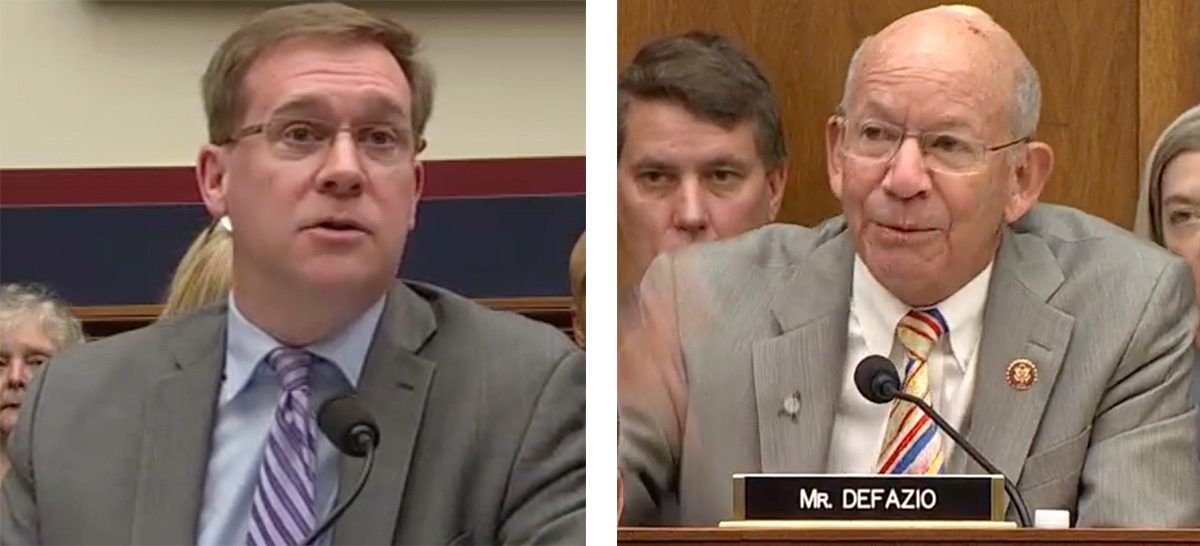
(Photos: C-SPAN)
It’s not easy to make an Oregon Department of Transportation official sound like a progressive on any transportation issue; but that’s exactly what U.S. Congressman Peter DeFazio did at a House Transportation Committee hearing in Washington D.C. yesterday where the veteran lawmaker’s skepticism around congestion pricing was on full display.
“You can’t just price people off the roads and say, ‘Hey, we solved congestion’.”
— Peter DeFazio, U.S. Congressman
A panel of experts and electeds from around the country offered testimony and answered questions from lawmakers at a House Transportation Subcommittee on Highways and Transit hearing titled, “Pricing and Technology Strategies to Address Congestion on and Financing of America’s Roads.” Among the panelists was ODOT Assistant Director Travis Brouwer.
Brouwer’s presence wasn’t a surprise since Rep. DeFazio chairs the committee and Oregon is actively working a tolling program. ODOT is also considered an innovator when it comes to road pricing. We passed the nation’s first gas tax in 1919 and ODOT has made significant progress on their pay-by-the-mile pricing program. What was a surprise was to see the stark contrast in their opinions.
In his opening remarks and during a tense exchange with Brouwer, DeFazio made it known that he’s not a fan of congestion pricing. This is despite the fact that ODOT and the Oregon Transportation Commission are currently working with the Federal Highway Administration on how to implement a plan on Portland-area freeways and the idea of pricing roads enjoys strong support from regional elected leaders.
More spending on infrastructure is what DeFazio is most well-known for on Capitol Hill. His proposal is to raise gas and diesel taxes and bond against the increase to create new revenue for projects. “We haven’t adjusted the gas tax since 1993 and it’s embarrassing we can’t do it,” he said at the hearing.
What’s notable about DeFazio’s position is that he believes the cure to congestion is to build more infrastructure that gives people options to avoid it; but he appears to be very skeptical of using congestion pricing to raise the money to pay for those projects. Listen to how he frames pricing at the end of his opening remarks:
Advertisement
“Now, we’re going to hear some things today, you know, you’re going to say, congestion pricing. Congestion pricing with what kinds of alternatives for people? You can’t just price people off the roads and say, ‘Hey, we solved congestion’. That person doesn’t set their schedule to go to work and they don’t have a lot of options. Unless you build sufficient options you can’t just price people off the road.”
He then referenced tolls in D.C. that can reach $4.70 cents a mile and said, “That’s not even a ‘Lexus Lane’, that’s a chauffeured limousine lane. Who can afford that?!”
DeFazio continued:
“Some of the legislators and mayor of Portland have decided, well, maybe we ought to just toll parts of our freeways. But of course it isn’t even going to be like a HOT [High Occupancy Travel] lane. No one is going to have an option. You’ll either use it or not use it. What about diversion? What about people who have to go from the east side of Portland to the west side of Portland to Intel to go to work? Sorry, it’s going to take you two hours or it’s going to cost you a bunch of money you can’t afford.”
Instead of pricing, DeFazio wants more federal investment in infrastructure and he’s also a huge fan of “smart technology”. He made several references to “smart” traffic signals during his remarks (and since there are no signals on freeways, it was kind of an awkward point).
The exchange between DeFazio and Brouwer came later in the hearing when the congressman asked about how the public would react to tolls.
DeFazio:
“What kind of public acceptance do you think that’s going to have? And how high do you have to price it to get to your targets to reduce congestion?”
Brouwer:
“Our initial analysis shows we are at a point of hyper-congestion on the Portland system where we have so many vehicles during rush-hour that our system is breaking down and through-put collapses. Our consultants have told us if we move a relatively small number of vehicles off the system at rush-hour it will flow much better and we can actually see our throughput increase greatly.”
DeFazio (with a dismissive tone and body language):
“So you think there are a lot of people optionally umping into the curves, in backed up traffic, they’re not doing that because they have to get their kids to soccer or to work at a certain time? It’s just people who decide who go out and therefore they won’t come anymore and they’ll change their schedule? You think there are enough people out there optionally that that’s going to solve this?”
Brouwer:
“I think there are a relatively limited number of people who are in that situation; but if we can move a few of them off… We did opinion research and saw people said one of the best arguments in favor of tolling with variable rates is that there are some opportunities for people to change their schedules, to move by a different mode, or to telecommute or take other ways of getting to work…”
DeFazio (interjecting):
“Well some people may have that flexibility. The question is, how many.”
DeFazio then quickly changed the subject back to technology and smart traffic signals.
Watch the full hearing via C-SPAN.
—
In related news, the Portland Business Alliance will host a forum on congestion pricing next Wednesday (9/18) at 7:30 am at the Hilton-Atrium Ballroom (921 SW Sixth Avenue).
— Jonathan Maus: (503) 706-8804, @jonathan_maus on Twitter and jonathan@bikeportland.org
Never miss a story. Sign-up for the daily BP Headlines email.
BikePortland needs your support.

